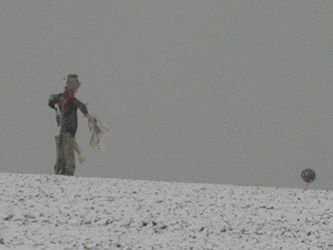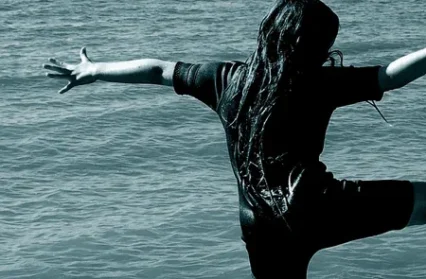This edition of the magazine was initially born out of a desire to acknowledge the significance of the recent Rhys Davies Short Story Conference, here is Katy Darby’s ‘The Scarecrow’.
He stands in the north part of the field, towards the brow of the hill, and he yearns. When the wind is up, it lashes him into strange stuttering movements – a jerky ballet of dip and swoop, bend and snap. When the rain comes down his clothes hang off him like washing on a line, heavy and dripping. When the sun beats (which won’t be for a while again yet) his straw grows tinder-dry and crackles, his ragged checked shirt lifts and dances, and his old felt porkpie hat – the one that got too battered, even for the farmer, five years ago – shrinks tighter on his stuffed head. He is a well-dressed scarecrow, as far as these things go: he’d put a tramp to shame. All he lacks is feet, and boots to put them in.

But rain or shine, wind or snow, the scarecrow yearns. For in the field below, where the wheat he guards becomes sunshine-yellow rapeseed when the season is right, stands another scarecrow, and she is the lodestone of his straw heart.
She was dressed by the farmer’s wife: a silly joke they shared, when they realised the farmer didn’t have enough spare garments to clothe another male scarecrow. She wears the height of 1980s fashion, dragged out of polythene bags laid down in the attic after the birth of their twin boys. The farmer’s wife had pulled the size 10 smock-dress over the straw lady with a rueful laugh; she knew she’d never get into it again. As she bent over to get her old print headscarf out, the farmer smacked her on the rump with a resounding clap.
‘She’s too skinny for my liking,’ he said, nodding at the scarecrow-woman. ‘I prefer a lass with a bit of heft.’
She’d giggled and called him a silly old fool. Then she straightened up and tied the scarf around the female scarecrow’s sackcloth head. Under the scarf was her mother-in-law’s blonde wig, worn proudly until the day she died. The farmer’s wife enjoyed dressing up the scarecrow; her little boys were too old for that sort of thing now, and they’d not been able to have the girl she wanted. So she took pleasure in pulling on the pink polyester gloves that from a distance looked like hands; stuffing the prickly sausages of legs into demure flesh-coloured tights, and fixing an elasticated belt with a shining gold buckle around the smock, to give the scarecrow-woman a nipped-in hourglass waist.
That was eight years ago. Four years ago the farmer’s wife had stopped coming into the field to say hello to the scarecrow lady, replace her tights or add a cardigan. A year after that, the farmer had stomped past the other scarecrow in the north field, dressed all in smart black, even his wellingtons, with tears in his eyes that the wind chased onto his cheeks in wet scars.
He’d stood there for a moment, side-by-side with the scarecrow at the brow of the hill. Together they looked down at the beautiful straw-woman, a little less neat than she had been, a little neglected; looking less as though she’d just stepped out of the pages of a magazine.
‘I ought to take her down, I suppose,’ said the farmer, and sighed. ‘I just haven’t the heart.’
The scarecrow did not have a heart either – but something, perhaps a mouse, stirred in his stuffed chest, in the place where he felt the yearning for the straw woman – and he would have sighed too, if he could. The farmer’s wife’s scarecrow was safe, for the moment. Just then, the restless wind growled and pushed the scarecrow’s head down in an attitude of reverence. All he could see now was the rubber toes of the farmer’s boots, black for mourning.
* * *
True to his word, the farmer didn’t take her down. Instead he did an odd thing. A month after the funeral he came out to the bottom field with an armful of his wife’s old clothes. The scarecrow recognised them because he’d seen her wearing them when she’d visited to fix up the straw woman, before she stopped coming. There was a tartan scarf in brave greens and blues, a sturdy tweed skirt the colour of a wild rabbit, and a red bobble hat she had worn in every weather except July sun. It was dead winter now, and the lady scarecrow’s thin cotton smock-dress was dusted with snow.
Carefully, tenderly, the farmer tied the scarf around the straw woman’s neck. He took off her thin print headscarf and pulled the red woolly hat firmly down over her blonde curls. Already she looked snugger. He did up all the buttons of her green cardigan, which took a while, because his thumbs were thick and cold and clumsy, and then he pulled the grey-brown tweed skirt over her head and fastened it around her waist, which seemed thicker, more matronly now. In a final flourish, he shook out the slate-blue quilted gilet his wife always wore, threaded it over her outstretched arms, and zipped it up tight. Now she looked like a proper countrywoman, dressed sensibly against the biting cold.
The farmer turned and waded up the hill, his face red against the snow beating about him like white moths. He still carried something under his armpit. The scarecrow wondered if he too was to get a change of clothes, though he was dressed warmly enough, and as any child knows, scarecrows don’t feel cold. Love, yes, but not cold.
But when the farmer reached him all that he was carrying turned out to be a pair of black wellingtons, so new and barely used that the shine was still on the rubber. The farmer himself wore his old green ones, thick with mud and snow.
‘I shan’t be wearing these again, I hope,’ muttered the farmer as he pulled the boots tight onto the scarecrow’s straw legs, and rolled the brown corduroy trousers over their tops to keep the snow out. ‘And we can’t have you rotting in the wet. The old lady’d never forgive me.’
He stood up and looked at his smart, weatherproof scarecrow. Then he turned to gaze at where the scarecrow’s face pointed, always in the direction of the prevailing wind, always yearning towards the upright, distant female figure below. In the farmer’s wife’s winter clothes, she looked more beautiful than ever, standing small against the low grey cloud and the bare looming hills. Tiny flakes of snow had settled on the farmer’s eyelashes and he blinked them off, fast and hard.
‘Silly old fool,’ he said, and grinned up at the sky, and then he stumped off down the hill into the soft folds of winter silence.












